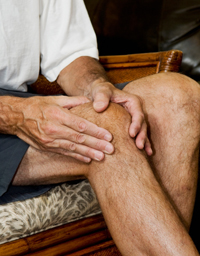 A UBC clinical assistant professor has made the first statistical link between two major types of drugs and nocturnal leg cramps – involuntary muscle contractions, often coming during sleep, that afflict 37 per cent to 50 per cent of older people.
A UBC clinical assistant professor has made the first statistical link between two major types of drugs and nocturnal leg cramps – involuntary muscle contractions, often coming during sleep, that afflict 37 per cent to 50 per cent of older people.
Scott Garrison, in the Department of Family Practice, has shown that a person who took a common type of diuretic (commonly used to treat high blood pressure) or long-acting B2-agonists (LABAs, commonly used to treat asthma or chronic obstructive pulmonary disease) is twice as likely to develop nocturnal leg cramps as those not taking such drugs. His findings were published Jan. 23 in the Archives of Internal Medicine.
Dr. Garrison, a practicing family physician in Richmond who is on the verge of earning a PhD in Experimental Medicine, used five years of B.C. prescription drug data to determine the number of people who were treated for cramps in the year after they received these drugs. He then compared that to the number of people who were treated for cramps in the year before they received these drugs. There were many more people in the first group (taking diuretics or LABAs, then being treated for leg cramps) than the second group (being treated for leg cramps and subsequently taking diuretics or LABAs).
Dr. Garrison, a member of the Centre for Hip Health and Mobility, found that for every 1.7 people who could be weaned off LABAs, and for every 2 people who could be weaned off certain diuretics, one patient would not need treatment of leg cramps.
“Nocturnal leg cramps are no laughing matter – they are extremely painful and unsettling,” said Karim Khan, a Professor in the Department of Family Practice and member of the Centre for Hip Health and Mobility, who supervised the research. “A few patients are afflicted almost nightly. Dr. Garrison has discovered a practical solution – modifying the patient’s prescription or reducing it, when most clinicians would have been looking to add additional medication. Taking many drugs, or polypharmacy, is a major health risk for older people.”